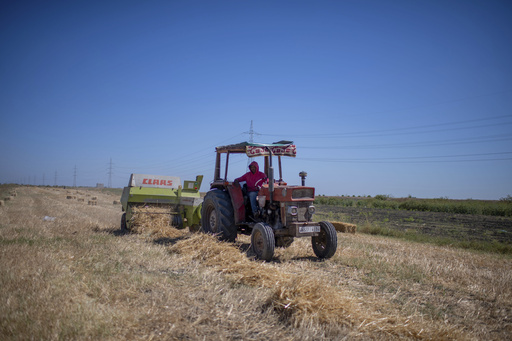KENITRA, Morocco (AP) — Golden fields of wheat no longer produce the bounty they once did in Morocco. A six-year drought has imperiled the country’s entire agriculture sector, including farmers who grow cereals and grains used to feed humans and livestock.
The North African nation projects this year’s harvest will be smaller than last year in both volume and acreage, putting farmers out of work and requiring more imports and government subsidies to prevent the price of staples like flour from rising for everyday consumers.
“In the past, we used to have a bounty — a lot of wheat. But during the last seven or eight years, the harvest has been very low because of the drought,” said Al Housni Belhoussni, a small-scale farmer who has long tilled fields outside of the city of Kenitra.
Belhoussni’s plight is familiar to grain farmers throughout the world confronting a hotter and drier future. Climate change is imperiling the food supply and, in regions like North Africa, shrinking the annual yields of cereals that dominate diets around the world — wheat, rice, maize and barley.
The region is one of the most vulnerable in the world to climate change. Delays to annual rains and inconsistent weather patterns have pushed the growing season later in the year and made planning difficult for farmers.
In Morocco, where cereals account for most of the farmed land and agriculture employs the majority of workers in rural regions, the drought is wreaking havoc and touching off major changes that will transform the makeup of the economy. It has forced some to leave their fields fallow. It has also made the areas they do elect to cultivate less productive, producing far fewer sacks of wheat to sell than they once did.
In response, the government has announced restrictions on water use in urban areas — including on public baths and car washes — and in rural ones, where water going to farms has been rationed.
“The late rains during the autumn season affected the agriculture campaign. This year, only the spring rains, especially during the month of March, managed to rescue the crops,” said Abdelkrim Naaman, the chairman of Nalsya. The organization has advised farmers on seeding, irrigation and drought mitigation as less rain falls and less water flows through Morocco’s rivers.
The Agriculture Ministry estimates that this year’s wheat harvest will yield roughly 3.4 million tons (3.1 billion kilograms), far less than last year’s 6.1 million tons (5.5 billion kilograms) — a yield that was still considered low. The amount of land seeded has dramatically shrunk as well, from 14,170 square miles (36,700 square kilometers) to 9,540 square miles (24,700 square kilometers).
Such a drop constitutes a crisis, said Driss Aissaoui, an analyst and former member of the Moroccan Ministry for Agriculture.
“When we say crisis, this means that you have to import more,” he said. “We are in a country where drought has become a structural issue.”
Leaning more on imports means the government will have to continue subsidizing prices to ensure households and livestock farmers can afford dietary staples for their families and flocks, said Rachid Benali, the chairman of the farming lobby COMADER.
The country imported nearly 2.5 million tons of common wheat between January and June. However, such a solution may have an expiration date, particularly because Morocco’s primary source of wheat, France, is facing shrinking harvests as well.
The United Nations’ Food and Agriculture Organization ranked Morocco as the world’s sixth-largest wheat importer this year, between Turkey and Bangladesh, which both have much bigger populations.
“Morocco has known droughts like this and in some cases known droughts that las longer than 10 years. But the problem, this time especially, is climate change,” Benali said.
__
Hassan Alaoui contributed reporting from Rabat and Kenitra, Morocco.
__
This story has been updated to clarify that the annual yields of the main cereal crops are falling in North Africa, but not globally.




